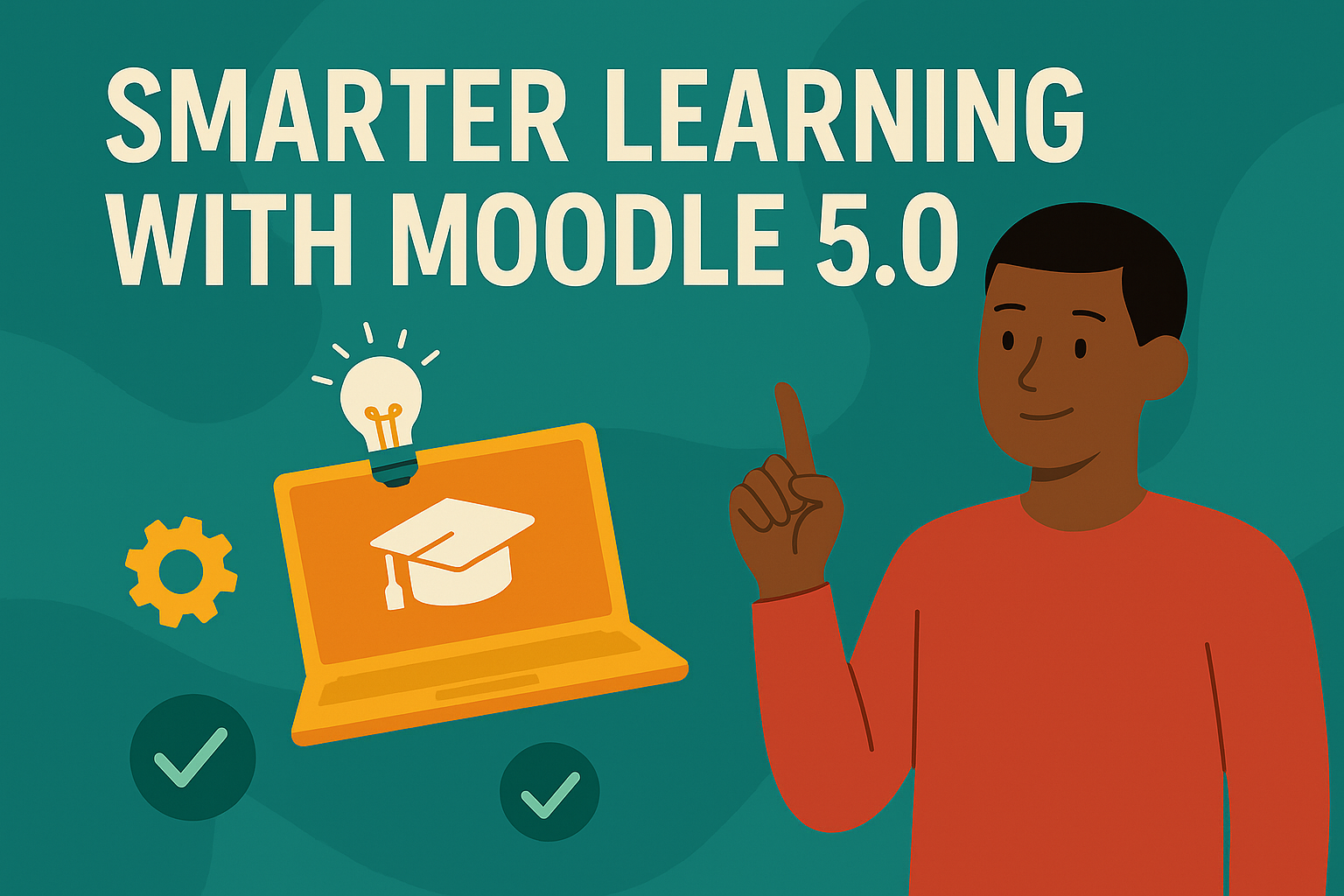Smarter Learning with Moodle 5.0: How AI Is Reshaping Assessments and Engagement
Keeping up with the Revolution(s).
Just when we were getting our heads around the Fourth Industrial Revolution (the current period of rapid change where technologies like AI, robotics, IoT, and biotechnology are blending the physical, digital, and biological worlds), the Fifth seems to be hard on its heels. 5IR is projected to be an intensifying of the collaboration between humans and machines, an outcome that is fast approaching, attempts to regulate it notwithstanding.
While this prospect may have arrived so quickly that we’re still trying to adapt, we have to accept that AI is here to stay for the meantime. Since, we’re stuck with AI and it looks like it’s firmly embedded in our everyday life, how can we make it work for our advantage?
For those of us in the educational and e-learning fields, the immediate consequence is the impact of AI on assessment and engagement respectively. The people at Moodle have been working tirelessly to integrate AI tools to make the best use of them to promote learning, prevent cheating and provide engagement. Here’s how they’re doing it.
General AI Tools in Moodle
The Moodle team introduced AI tools into Moodle 4.5 in October of 2024.
These features are designed to improve teaching, learning, and course management while allowing institutions to stay in control of their data and AI usage.
1. AI Subsystem for Flexible Integration
-
-
- An AI subsystem enables organisations to integrate various AI providers (like OpenAI, Azure, and open-source models such as Ollama and LocalAI) into Moodle.
- Designed with a human-centred approach, it allows admins to decide if, how, and where AI is used on their site.
- The system is scalable and secure, ensuring institutions aren’t locked into one provider.
-
2. AI-Powered Content Creation
-
-
- Educators and learners can generate text and images directly in Moodle’s editor.
-
- AI-generated content is transparently tagged and includes auto-added descriptions for accessibility.
-
- Learners can use AI tools (if enabled by their teacher) to summarise text or create content, supporting digital literacy skills.
-
3. Educator Controls and Safety
-
-
- All AI actions are logged for transparency.
-
- Institutions retain full control over permissions and can configure AI settings to match their policies.
-
4. Benefits
-
-
- Saves educators time in content creation.
-
- Engages learners through interactive tools and personalises their learning experience.
-
- Supports inclusive practices with accessibility-focused AI features.
-
Moodle 5.0 has added functionality to these tools, including an Explain tool that allows learners to ask for explanations of a particular text.
AI and Assessment
How is AI impacting assessment strategies?
It’s a perfectly normal reaction when considering AI and assessment in the same space to go directly to all the possibilities for cheating that AI offers. While these are certainly a legitimate consideration, it’s encouraging to know that there is another side to this story. Many institutions and learning providers are using the opportunities presented by AI to develop new assessment practices.
In purely practical terms, many of us want to know if AI has progressed to the point where it can analyse and mark essay or other open-ended/free-response type questions. This kind of analysis is something large language models (LLMs) do well. Recent developments have used this ability to produce tools that can process a student response and give both feedback and a grade if required. You do need to know how to prompt the AI properly and you also need a firm grasp of the parameters you require for a correct and accurate answer. Nonetheless, this is a big stride in the direction of fully automated self-guided learning.
Other possible integrations include the ability to personalise feedback in real-time. AI can detect faulty reasoning and redirect a student to the correct conclusions. It can predict or spot a skills gap and guide a student to repeating or reinforcing learning in a particular topic.
Another great assessment support tool is the ability to generate quiz questions directly inside Moodle, dramatically lessening the time and effort needed to build assessment materials.
Returning to the very real cheating considerations, AI tools are available to detect when a learner has not completed an assignment themselves. Alternatively, third-party detection for plagiarism and the like are also valuable AI-based addons.
What is truly exciting is that all these new abilities are opening up the opportunity to explore new and more effective ways to create assessments that test and measure a student’s progress. We are no longer restricted to the old, limited methods that penalised differently abled students or could not overcome entrenched discriminations against disadvantaged learners.
Value-Add – Scenario-based Learning Levels Up

One direction that is being explored in an effort to overcome AI-assisted cheating is that of observable assessment. It’s nearly impossible for an AI to help a student work directly with something material or to defend an opinion in a face-to-face situation. Scenario-based learning is an effective way to prepare learners for this kind of assessment.
People learning new skills can now work through realistic workplace scenarios, practice customer conversations, or tackle problems that actually happen on the job. This makes a huge difference for company training and professional development, where you really need to practice what you’re learning.
The big payoff from scenario-based learning is the engagement it offers. When people get to make decisions and see what happens next, they stay more interested and think more carefully about their choices. Instead of just memorising facts, they’re actually using what they know in situations that feel real – without the pressure of making costly mistakes. This builds both confidence and real ability to handle similar situations when they arise
Conclusion: Moodle AI in Action
We’re excited about the latest options for using AI in learning management systems. There’s tremendous scope for exploring new and innovative ways to ensure that learners get the best results from their efforts.
If you’re interested in seeing these tools in action or would like to learn more about how to use them, why not join our free webinar on 24 July where we’ll demonstrate AI integration, scenario-based learning, and next-gen assessment tools in real time. If you missed the live webinar, you can watch it here.
Kerushan Naidoo
Head of Moodle Development
Kerushan has a decade of experience working wonders with Moodle. That’s why we rely on this man for the winning plan. He is an active Moodle community member and, either knows of the perfect plugin for your needs, or will customise and develop a plugin to meet your unique requirements.
